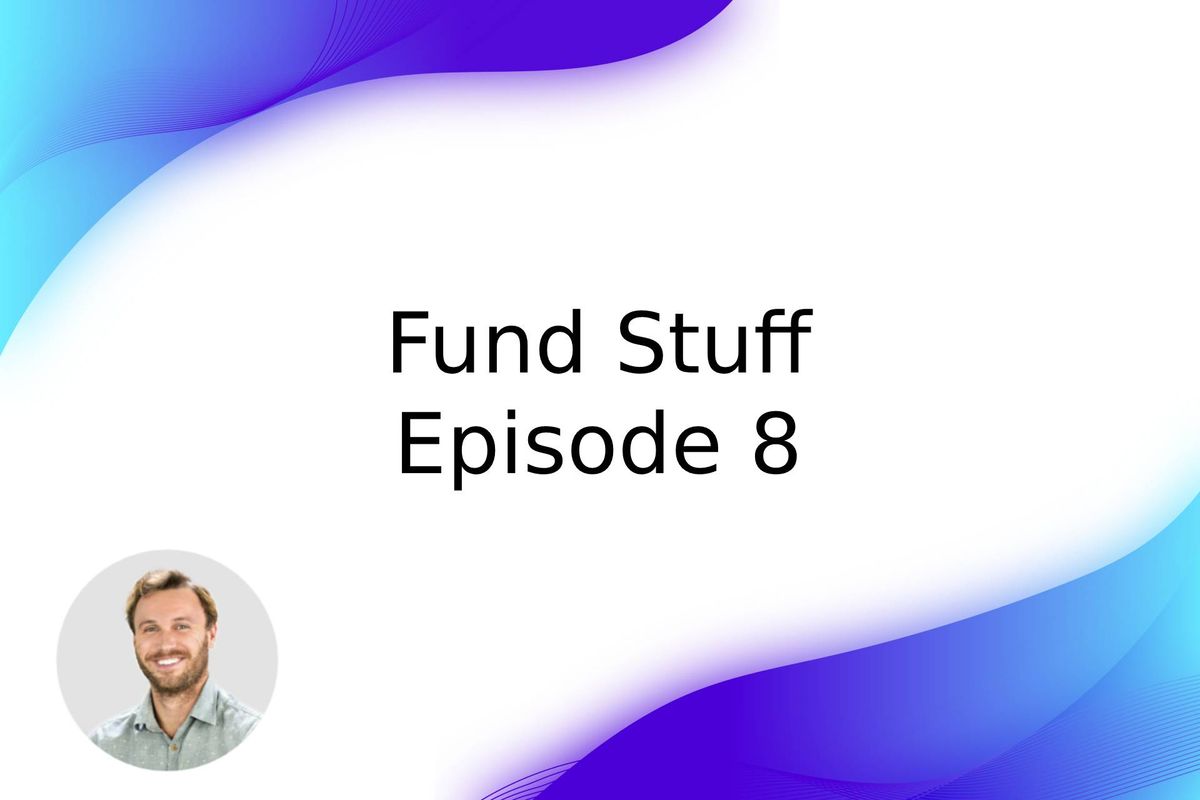Fund Stuff - Episode 8

Danny and Andrew chat about operating our latest acquisitions.
Subscribe!
# Fund Stuff - Episode 8
[00:00:00] **Andrew Pierno:** Sweet. All right. So the podcast, I called it fun stuff. I think it's episode seven or eight. We're not sure, but anyways,
I figured out somewhere along the lines to, to take someone's terrible advice and do everything kind of shitty,
[00:00:11] **Danny Chu:** that was, that was the preamble, I think generally.
Yes. I, I, I'm learning to see the. Generally that that's okay. however, yeah, I think this week specifically, I spent the majority of my time doing support because, sometimes you walk into a situation not knowing how shitty something is. And so then you kind of get, blown away by how bad something is.
And I think. That was just something that I had to, to be okay with, um,
[00:00:46] **Andrew Pierno:** this week. So for context, we're talking about work cloud, which we bought. Was it a month
[00:00:51] **Danny Chu:** ago already? Um, yes. In December a little less than a month
[00:00:57] **Andrew Pierno:** ago. Yeah. You know, you said something earlier this week. Honestly, I hadn't thought that much about, I don't know if this is arrogance or naivete.
Probably a bit of both. You think of like software as these kind of relatively complex. Systems. Right. And, and it is a system with some kind of like flow chart and there's processes and whatever, there's others, there's all this like normal computer science shit, but like the sales side of the house, or let's say the non-engineering side of the house has just as much stuff, if not more.
And to be honest, in some ways it's a lot harder because. I can just write code for stuff, but it's hard to like get, when one of those nodes in the process diagram is like a person and you need the person to like, get a
[00:01:42] **Danny Chu:** thing done. Yeah. Well, it's, I guess if I were to describe it with one word, I think code, you can figure out a lot more context on your own.
Um, whereas when you're customer facing context, Less in your control, especially when you weren't the one that built it. Um, yeah. And yeah, I think that's where a lot of that work is where I just have to, because for me, like, I don't want to be the new person that assumes a bunch of things. And then really like, you know, presents a really bad step forward.
Uh, when our opportunity here is to really grow this, really quickly and really effectively. Ourselves and for our customers. And so, yeah, that context component is it's not in your control as a non-engineer cause for you, like, if something is broken, generally speaking, you can go dig through the code and figure out some context to help you figure out the outcome or the solution.
It's less that way. it takes a little bit more time.
[00:02:47] **Andrew Pierno:** Yeah. I had a meeting today about a sentiment investor. So this guy, he runs something called game dunk, terminal, uh, which is like a plus fucking great name. I love that name. Uh, it's this open source. So that the idea for this guy's company is that like all of these API APIs and everything in FinTech for like financial data are extremely expensive.
Like getting access to. Real-time stock prices is like, I don't know, $20,000 or $25,000 for a license. Um, like stupid expensive. And so he's like, I'm gonna make everything kind of open source and free. Yeah, they want to use sentiment investor. And he said a bunch of people come to, I don't know, reach out to him and say like, I want to trade based on sentiment data. but yeah, I opened the conversation with Lee. Listen, like we didn't get much of a handoff from like the previous owners. I don't know what the fuck they signed with you.
I don't know what they told you, but like clean slate. My man, I don't know what the hell's going on, but like, I'm here for you. Like, let's go figure it out. And then he, he was a super cool guy. We just, you know, sorted out from there.
[00:03:50] **Danny Chu:** Yeah. Do you think that's, I guess what would you, like, how did that happen?
Like, you know, that's obviously something, you know, that would say it's fairly unique and one-off, but like what, what would you say was the reason that it. I was able to go to square one, but start off on a really good foot. Like, is it because they had a really good experience with sentiment investor before?
Did they do personally you think maybe, or.
[00:04:20] **Andrew Pierno:** Oh, I don't know if I think that highly of myself to say that, like he like, oh, I looked at my beautiful face and thought like, oh, I should be nice. Give this another chance. Yeah, no, I have no idea. I just, you know, I do this with like cold email for the, on those sales calls to like, I don't know, just be I try and be funny.
Uh, and then. But mostly just be honest, right? Like, yo, we got no handoff from these guys. I literally have no idea what you have been told. and talk about like laziness too. Like that's, that's an example. So like the idea that I'm going to go spend like four hours and dig through like old emails. I am just not white.
To do that. I'm pretty sure at this, the ripe age of 33, I'm like incapable of doing a task like that.
[00:05:06] **Danny Chu:** But I would actually say that because I'm the complete opposite where like every conversation, even that person, that person has had no conversation with me. And this has happened, you know, the past two weeks, you know, countless times where person I'm talking to has no idea who I am.
It's the first time that I'm introducing myself, but I've, over-prepared. And, you know, so I, I, but, but yet I approached the conversation to say, Hey, I know nothing about this. And I think, I think they can kind of tell that, like I kind of do know, and sometimes my questions are fairly, uh, their leading questions kind of leading questions.
And so I've had to catch myself a little bit to like, to then actually admit that like, Hey, here's what I know. And then like being more honest than saying like, hello, can you help me validate if this is correct? You know, are you having this experience, blah, blah, blah. But I've tried to fake it. And it's been, I've had to admit to myself that it's like, that's not, uh, that's not helpful.
Yeah. I
[00:06:11] **Andrew Pierno:** mean, part of the problem. And I guess the reason I take that. Stands by default, just like the, I don't know what the hell is going on by default is because I have like a Calendly. And so like random people will like find that fucking link and like bullshit. Like from two weeks from now, I'll have tweeted with them like six months ago.
And then I it's like, I'll do 10 a day sometimes. And they're like back to back. And so I just show up and I'm like, listen, I don't know if I'm like buying something from you. I don't know if you're selling something to me right now, or like, I'm trying to sell something to you. Like, can we, can you just give me the context for how the fuck we came to be on this kind of conversation?
Most people are like, yeah, no worries. I get it. Like, blah, blah, blah. And I'll be like, oh, okay. Yeah, that, that rings about, or sometimes not. And I'm like, listen, I have no idea. Have no idea how we got here, but great to meet you. What's going on.
[00:07:04] **Danny Chu:** I would say the. And you, I guess you tell me, but generally I would say out of the three of us, including Henry, um, you take the most, and probably the most effective set of notes.
And maybe that's, maybe that's a part of it where like, because you walk into things, not knowing, like you sort of have to have some sort of way to retain the thing, so you can reference it at some point. I don't know, like I would say, cause your notes are. You know, helpful and necessary, and usually always catches something that I didn't on my notes.
And so, I don't know, maybe that's a good balance.
[00:07:40] **Andrew Pierno:** Yeah. That's only with this, by the way. I take no notes anywhere else for anything else. It's, it's exclusively for like our XO diligence calls that I take the notes mostly because I think what it is is like we've been burned a couple of times after.
You know, like you have a seller on the line, they're very invested in making sure that you feel like this is a great buyer, right? Like they want to close the deal. They want to, they want us to buy their thing. And so I know now that we've done this a few times, that like, that might be the only time we talk about that thing.
And so in three months, what I'm trying to fucking do something I'm like, oh yeah, right. Like he said that on that call or something about this, and I checked the notes and I'm like, uh, You know what it is, it's, it's like thinking about future Andrew. And like, I know how frustrated president Andrew is with the world.
And like, I just want future Andrew to have like a slightly better time of it. Um, you know, that's, that's how I like, that's how I think about it. It's like being nice to my future self.
[00:08:41] **Danny Chu:** I feel like that's considerate of you.
[00:08:43] **Andrew Pierno:** Yeah. Yeah. It is considered. Um, but yeah, it overall, like my question for you. In the context of us, like we're going to try and buy more things this year.
How do you feel about transitioning from operating work cloud kind of day to day, right? Like effectively you're CEO of where cloud? Um, I feel like I, for whatever reason, don't mind bouncing between companies and code basis, like, it just doesn't bother me that much. I don't know if it's because I've been doing it for a long time or what, but.
It just doesn't bother me that much to be like, oh, like, yeah, let me fix this thing over here and spend two hours on work cloud. Boom. Let me switch to sentiment investor and like push this thing out. Oh shit. I just remembered like, there's a bug over here, but we're going to be doing that for awhile on devs and like, I think that's fine.
We have Diego now first full-time for full stack full-time developer, which is phenomenal. He's kind of getting ramped up. Um, so I feel like what I'm, what I'm asking is like I have on the dev side, we're going to spend this next month probably the most time. On word cloud. That's what I've been doing for the past couple of days.
And like couple of weeks is the most time I'm spending now on, on work cloud. Um, but at a certain point, right? Like our bug board is going to get like smaller and smaller and there'll be like feature requests, but nothing burning, like no fires to put out. Um, so I feel like at a certain point we'll be able to say, cool.
I think Diego and myself have capacity to go buy something else. Because the ramp up time takes like two, three months. And then once we kind of like, know our way around the code base, we can start to think about buying a new one. But for you, do you feel like you have a clear path to how you're going to like set work cloud on a trajectory?
Um, maybe hire someone to kind of take that on or not, or just be like, okay. I know worked out enough and it's kind of on a trajectory that I can think about buying something else now.
[00:10:38] **Danny Chu:** there's definitely a point where that handoff, feels easier and natural. And I think that point comes when, uh, I've set my brain, like the, these three, like business related components, To be stable.
And when I say stable, I mean, you know, when it was handed off, uh, you know, it was, uh, a little bit messy and maybe not, uh, optimized. So just tweaking a couple of those things. And I think those are especially for work clout, like billing, uh, and making sure, yeah. Payment and subscriptions are all running in an automated or as automated of a fashion for all of our customers.
So there's no late payments. Um, that's, you know, sales and making sure that whatever that funnel is and how everyone wants to run that funnel, whether it includes it's fully automated and includes some human touch points, whatever it is that that is. You know, stable and straightforward and operating, and then just support that, you know, we, the customers know where to go for what and what escalation looks like.
And I think once those three things are at a point where, um, they're, they've been repeated many times and nothing breaks, I'd be ready to, you know, and I think it's ready to be handed off. Um, I just think it's a little. Everyone tries at this stage, like everything is built on something being figured out.
And so there really isn't a lot of like processors stability. So just building those things for each of those three core kind of operations of the business, then I think it'll be ready to go
[00:12:24] **Andrew Pierno:** to, do you feel like that will involve hiring people?
[00:12:29] **Danny Chu:** Yes. but I don't think it needs to be one per. Per process about one person could do all three potentially, um, with some of our shared resources.
you know, and I think depending on how automated we want certain things to be like, do we want to improve sort of the product led strategy that, Potentially has, you know, things like that, you know, decisions that we want to make on what the customer experience is. I think we can try to automate it because, you know, I think there's some opportunity there, but, um, uh, yeah, I definitely think there's a requirement for a human, um, but one that could potentially do all three.
Do you feel like
[00:13:14] **Andrew Pierno:** that person would be more of a CEO or actually more of a sales.
[00:13:19] **Danny Chu:** I think what was the term that we used GM? Uh, I mean, I think that's a great, term. I mean, would it be a salesperson that's probably, for me personally, like that's what. I think this or any of our businesses need needs the most of is more revenue.
So like, that would be like for me right now, like I'm just trying to figure out billing catch up on, you know, are like accounts receivables and get support to a place where bugs that were promised to be squashed are squashed. And then I want to shift all of my focus to like, how do we grow this thing?
How do we. You know, uh, you know, help, uh, increase all of our customers contract values. and like, for me, it's just, I, I need to get to that point as quickly as I can. So maybe I would say maybe, maybe that it's a salesperson. because that to me is what's most exciting.
[00:14:20] **Andrew Pierno:** Do you feel like three months is a good timeframe to get a system like that up and running?
Yeah, the reason I, I, uh, About three months is like, if we're going to try and do I think last year I was like, oh, let's do one a month. And I think if we were buying like sheep best type things, we could do one a month. if we buy them right. I, I don't even know I'm looking at micro guy right now, dude. I don't even know if there are 10.
We could buy one. We could buy it. Uh, I mean, maybe there are, but like literally spoke with somebody today. They make 32,000 in annual revenue asking price $500,000. Are you fucking kidding me? People I think are just like make, I don't, I don't know. I don't know. It's like. I don't know where they get the flavors to, to list a big fat number like that with so fucking little rather now they're all living in venture land is what they are.
They're like bootstrappers but then they think, oh, when it comes to like valuations where this like unicorn, uh, or where like this Silicon valley, you know, fucking highfalutin startup, it's crazy. but yeah, a word cloud type product. Like if we take, if we bought more of those, which are arguably better buys in some ways, um, actually I don't know, TBD on if they're better buys for us, but, um, do you
[00:15:47] **Danny Chu:** feel less, I'm less confident that it's the, like, I think I was in the beginning very gung-ho that we're called as the right buy for us, but I am.
I've taken a step step back from that confidence. Just a little bit.
[00:16:02] **Andrew Pierno:** at the, I had always seen the smaller ones as being much easier. Uh, not smaller ones. Sorry. Self-serve ones as being much easier. Right. So we buy a sheet best tomorrow. Uh, our shared services team looks very different than if we keep buying workload type product.
Not necessarily that one's better, right? Like per on like a dollar. Unlike a dollar per head count basis. I think we're cloud will win, uh, like this year with you at the helm. But if we were to buy she best in, uh, I don't know, 10 more, she best then our shared services model. I think that one missing component we don't have today would be a content, a content piece, and like a proper like marketing function.
Cause I don't, uh, I don't know how to do that really. Or if I do, I just don't want to, I'm just not
[00:16:48] **Danny Chu:** that good at it. Yeah. I mean, Going back to it, to your question of like, oh, is this person sort of a salesperson? I think, I want to just say yes, like a lot of the dev, you know, con content, which again, you said, you know, for us right now, we don't have, and then, you know, support, those are all shared resources that we have and that we can deploy.
Um, even for something like a word cloud, and we've seen that over the past couple of days and how to be honest, like how, how quickly we push things out. Um, and how well we're communicating with customers, but yeah, sales will be sort of the, the X factor, but, you know, I wholeheartedly believe, um, whether it's myself for, you know, somebody that we bring on, that they would incrementally, uh, add to the value of the business.
And for me personally, it's just the predictability or the, the, the predictability of like, you know, how, how to grow. Um, just cause I'm not a marketer, I'm not, you know, not a product like lead person, so to speak. And so for me to comfortably and confidently know how the thing is going to grow, like I like to have a sales person at the helm.
So, um, Yeah. I think having that person at the end of 90 days would be a, uh, successful, or it would be an optimal goal to have I think.
[00:18:19] **Andrew Pierno:** if we're next company, what are we buying? Are we buying self-serve? Are we buying something with a sales function,
[00:18:25] **Danny Chu:** I think probably another, uh, it's self-serve but a bigger one bigger self serve with yeah. With more ARR.
yeah. Yeah. I mean, I think I am, I am in agreement and that, like, we really haven't been forced to have and figure out the content piece. And I think it's probably worth figuring that out sooner rather than later. And, you know, having, you know, like a product lead, company in our portfolio that requires that to grow.
That would probably push us to figure that out sooner rather than later. and that's going to be a big piece of how, how we win, um, with some of these smaller ones, I think.
[00:19:15] **Andrew Pierno:** Yeah. I, and so when we have done content, we've done maybe five blog posts that are like from somebody else that wrote it and we posted it.
And so like, we have like a little bit of a flywheel. My problem is I just don't have enough personal time. Man the shop. So we've found developers who are also writers that have written articles. We hired them. We like, you still have to project manage them. And that is the part that I feel like I'm not confident we can outsource to anyone, but like myself or yourself, at, at the moment.
Right. Cause I, I did it and then I like took my eye off the ball and the stuff that we got back from these guys after we paid. I was like between just garbage and like totally useless. In some cases, some of them were very good and maybe, I don't know, all of this is just like a capital inefficient thing, but, um, so I feel like it wouldn't be that hard for us to stand up that motion.
It's just like, Keeping your eye on the ball and having somebody that we trust, like just making, reading the fucking articles and making sure that like, oh yeah, there's value here. Like, no, this is just like a total rip off of like this other dudes media. Like, we definitely can't post this, but yeah. I mean, I don't, I don't, uh, I don't think that there's, I don't think that that one would be actually that difficult.
[00:20:35] **Danny Chu:** Yeah.
[00:20:36] **Andrew Pierno:** The expensive, but I don't think it would be that difficult.
[00:20:40] **Danny Chu:** Yeah. And I think the faster we spin that up more consistently, you know, the other portfolios will benefit, but I, you know, like I think getting another, uh, getting a larger ARR self-serve like product led type of company. Like that one is probably a good one to get next.
But I don't know. I, I, I think one of the, our, points, uh, or pillars I guess, is that, you know, we try to find those companies that, uh, had a little, like. Uh, inflection or a little lightning in a bottle, um, or, you know, it's just a very unique circumstance. I think that's, that's also something that we can't really predict.
Right. So, and I think that's a cool way to, and it kind of aligns with why we exist in the first place. so who knows it could be another, another YC company, That serves small to medium-sized businesses with higher ticket, uh, contracts who knows.
[00:21:45] **Andrew Pierno:** Yeah. I I've been having conversations with some potential investors for whenever we start syndicating deals.
The reality is like when we go to look on micro acquire Twitter, wherever we don't know what is going to be available. And if it just so happens that we get. Price. I find a great product for a great price. I feel like we don't have the luxury to say, oh, but it's not this right. Because if we do that, I mean, I, you, you weren't quite around when we're doing this, right at the beginning, but we sat for like, for like two, I don't know, maybe three months.
And didn't buy a damn thing because we couldn't find anything that like met the thesis. And since then I've been like, everyone always asks like, so, you know, what is your thesis? And I'm like, listen, the reality of this is like, I don't know that we can have one yet. I would love to have, it would be so nice to be like, we buy.
Climate tools. Right? And it's like, is this a climate tool? Yes. Sweet. We'll take a look at it. Right? Like it's but like, I don't think that we can afford to do that because if something comes up tomorrow on micro choir, that's like slightly too big or slightly too small, but it's a great price. Um, and like, we feel like we could execute well on it.
We should buy that.
[00:23:00] **Danny Chu:** Yeah, it is, it is tough. Um, and you know, like last night, for example, you know, I think looking back on it, we probably could have saved that conversation with that person, even our own time, recognizing like that there was like literally no growth for the period that it was however, you know, Companies that didn't have growth or didn't have substantial rev like revenue.
And, um, so like the, yeah, the fact that like, you know, it's hard to assess something just based off of, you know, what we see on the micro require listing or even the first conversation, you know, sort of proves that we still have. I haven't figured it out or don't, don't don't know yet, like what, what it is, and to your point, like, we probably shouldn't pigeonhole ourselves at this point, um, to, to that sort of hypothesis or thesis or whatever.
[00:23:57] **Andrew Pierno:** Well, onward and upward, then we'll, we'll figure it out as we go. But, uh,
[00:24:02] **Danny Chu:** yeah, but 90 days, uh, I think, I think is a good timeline to be prepared, to hand it off. and I think that's, that's, that's what I'm marching towards. I think 90
[00:24:14] **Andrew Pierno:** days is a little aggressive. I think 90 days is like a north star.
Once we have done this a few times, I don't think we'll get there in 90 days. Just the reality of the cashflow and having to hide. Um, like this GM position, which jury is still out on, whether that could be somebody that's a little bit junior. Um, like we had a great guy that just applied. Um, I saw, yeah, I'm like, oh man, fuck that.
It's those kinds of things that make me want to just be like, okay, fuck it. Like, let's go raise a bunch of money and just go be, um, like a kind of, I dunno, a venture backed startup that buys. Venture backed started, right? Like go and do that because we would just be able to grab these really great people.
We could be a little bit less price sensitive. Um, and the grip, like, I don't think if you keep, if you project that forward, the farthest, I can go. I'm talking about becoming XO, becoming a public company, which, you know, one day allow willing. That would be fucking awesome. I love that. Um, I don't think the market would be as price sense, uh, as sensitive to like, uh, a very large valuation if we post it real revenue with real growth, um, and maybe we could be able to be.
Both giving these guys really great exit numbers. Um, and also, you know, being good to our shareholders
[00:25:37] **Danny Chu:** too. Yeah,
I like it. And think it makes sense. my goal will be that not 90 days to have that person and have the cash to hand it off, but have those three sort of processes straightened up. So whenever we do figure it out, it'll be ready to get handed off. Love it. Yeah.
[00:25:56] **Andrew Pierno:** Yeah. And on the dev side, it's not like I was a real hero here.
I mean, I think I took down production for 30 minutes an hour, the other
[00:26:03] **Danny Chu:** day, so all good. Yeah.
[00:26:08] **Andrew Pierno:** It's happened once for every acquisition. We've done. Like, I don't know what it is, but there's just a point where like, I mean, you know, we ask people to like document stuff, but like, I know how that is. It's like, none of it's like super documented.
So admittedly I've taken down production on everything we fought for like at least an hour, if not
[00:26:27] **Danny Chu:** longer. Yeah. It's interesting. I mean, we've, it's the nature of what we're taking on. Like we're, it's funny just because. I think it goes along with the idea that like, we don't have a thesis and maybe, and I don't think we should at this point because the companies that we're buying to be honest, like, it's not like they've figured anything out or they might probably wouldn't be listed, you know, like available to sell.
I think that to me was just like, what we're buying is just, you know, Yeah, for lack of a better word, just like a pile of shit. It's just a degree of whether it's really bad or really good shit and you know, there, and then just trying to sift through and, you know, make what you can and then converted into.
You know, really good, really good soil and fertilizer. Well, I mean,
[00:27:17] **Andrew Pierno:** that's not quite true. Like we're buying, we're buying, we're buying cashflow, we're buying cashflow. So it's like, yeah. I mean, all these things are in various states, but the thing, the thing I still go back to is like, other than that kind of like, you know, lightning in a bottle type type thing that we're just capturing, I've, you know, building your way into some kind of product market fit.
It's just a messy, messy process. Almost no way to do it with like a single clean code base. Totally. No way. So I don't really, I never get in there and like resent. Oh yeah. It's owners, unless it's in like a language, I just don't like them. Like I don't care. And I
[00:27:54] **Danny Chu:** don't. And you know, I don't mean that in.
Negative way at all. Like for me, I love the zero to one. I love, you know, we talked, we were talking about pricing the other day. Like, you know, I love that things are like one-off, you know, or things are, uh, you know, it's like, why the heck did this happen? You know, like that's, that's what for me personally makes it really fun, um, to see experimentation and tests.
So, To me that is not a negative. Uh, it's just the nature of what it is at this point. Um, yeah.
[00:28:30] **Andrew Pierno:** Well, I'm gonna, I'm gonna cut it off from here, but, uh, Henry is going to join us now, but, uh, super excited to have the man then a killer first couple of weeks.
[00:28:39] **Danny Chu:** I like it here. And uh, we'll keep it going.





